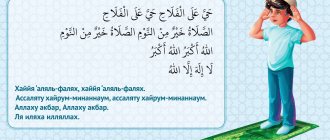This and other articles about Muslim prayer can always be found in the “Namaz” section. Prophet Muhammad (peace and blessings of God be upon him) said: “If the time for prayer has come, let one of you recite the adhan for you, and the most worthy one will be your imam.”[1] Wanting to show how reciting the azan is a manifestation of piety and an encouraged act, the Prophet emphasized: “If people knew how much sawab (reward) [is contained] in reciting the adhan and standing in the front row during prayer, [they would not have found] There was no other possibility of granting this right to one of them other than by drawing lots, then they would have resorted to this”[2]. Reading the azan and iqama in the mosque before Friday and the five obligatory prayers is “sunnah muakkadah” for men[3]. Failure to say them before prayer is blameworthy, but not sinful. As for the namaz during an eclipse of the sun, the Tarawih prayer, as well as holiday and funeral prayers, when performing them collectively, instead of the azan, “as-salatu jami'a” (الصَّلاَةُ جَامِعَةٌ) is pronounced instead of the azan. The recitation of adhan and iqama by women is not encouraged[4].
Azan is a notification of the time for prayer and a call to perform it.
It is pronounced loudly immediately after the appropriate time has arrived. The reader reading the adhan[5], based on the provisions of the Sunnah, raises his hands to the level of his ears so that the thumb touches the earlobe[6]. If the azan was read in a mosque in a city or district, people who did not come to the mosque do not have to read it in their apartments. In this case, it is enough to read only the iqamat, with which the alims (theologians) of all madhhabs agree, except the Shafi'i one. According to Shafi'i theologians, reading the adhan even in this case is desirable.
Contents of Azan
- Allahu akbarul-laahu akbar (2 times) (Allah is above all)
- Ashhadu alla ilayaha illallah (2 times) (I testify that there is no object worthy of worship except the One God)
- Ashhadu anna muhammadar-rasulullah (twice) (I testify that Muhammad is the messenger of Allah)
- Haya 'ala salting (twice) (Hurry to prayer)
- Haya 'alal-falyah (twice) (Hurry to salvation)
- Allahu akbarul-lahu akbar (Allah is above all)
- La ilaha illallah (There is no one and nothing worthy of following the laws except following the perfect laws of Allah Almighty)
What is important to know for the listener of the adhan
According to the testimony of Mrs. Aisha (may Allah be pleased with her), the Prophet (peace and blessings of Allah be upon him), when he heard the adhan, changed in behavior: “The Messenger of Allah talked to us, joked, but if the time for prayer came, he became as if didn’t know us, and we didn’t know him.” That is, he left everything and prepared for prayer.
Having heard the adhan, we must certainly respond to it properly. We must begin preparations for prayer, abandoning all other worldly affairs, even if this activity is reading the Qur'an. How can we ignore the call of the Almighty Allah through the muezzin? The Prophet (peace and blessings of Allah be upon him) told us: “Whoever repeats the words of the muezzin sincerely will enter paradise.”
Desirable actions of the listener of the adhan
- Repeat the muezzin's words to yourself. The exception is the words “Hyiya alas-salah, Hyyya alas-salah! Hyyya ala-falyah, Hyyya ala-falyah! After the muezzin reads these words, we must say “La hawla wa la quwwata illa billlah” (“There is no strength and might except with Allah”).
- After completing the azan, it is advisable to say: “Ashhadu al la ilaha illallahu wahdahu la sharika lahu wa anna Muhammadan abduhu wa rasulyuhu, radaytu bilLlahi Rabban, wa bi-Muhammadin rasulan, wa bil-Islami dinan” (“I testify that there is no god but Allah , who has no partner, and that Muhammad is His slave and messenger. I am pleased with Allah as a lord, with Muhammad as a messenger, with Islam as a religion).
- Make a dua (supplication) for the Messenger of Allah (peace and blessings of Allah be upon him) with the words: “Allahumma Rabbah Hazihi dda’wati tamati wassalatil-kaimati, ati Muhammadan al-Wasilata wal-fadylata, wab-ashu makaman mahmudan allazi wa-adtahu” (O Allah, Lord of this perfect call and this ongoing prayer, bring Muhammad to al-Wasila (Al-Wasila is the name of the highest level of paradise) and to a high position, and guide him to the place of praise that You promised him. Verily, You do not break a promise !)
- The Prophet (peace and blessings of Allaah be upon him) said: “Truly, the supplication (dua) between the adhan and the Iqamat is not rejected.” Therefore, you should not neglect this time, but pray to Allah for yourself.
- Anyone whom the adhan finds in the mosque should not leave it except for a good reason.
Words of the Iqama according to the Hanafi madhhab
- Allahu akbarul-laahu akbar (2 times) (Allah is above all)
- Ashhadu alla ilaha illallah (2 times) (I testify that there is no one and nothing worthy of worship except Allah)
- Ashhadu anna muhammadar-rasulullah (twice) (I testify that Muhammad is the messenger of God)
- Haya 'ala ssolya (twice) (Hurry to prayer)
- Haya 'alal-falayah (twice) (Hurry to salvation)
- Kad kamatis-solyatu kad kamatis-solyatu (Prayer begins)
- Allahu akbarul-laahu akbar (Allah is above all)
- La ilaha illallah (There is no one and nothing, there is no object worthy of worship except Allah)
The history of adhan and kamat
The adhan, as we know it today, appeared in Islam in the first year of the Hijri, when the Prophet (peace and blessings of Allaah be upon him) decided that Muslims needed a specific call to prayer. To do this, he consulted with his companions. But this did not lead to any definite solution. That night, the companion of the Messenger of Allah (peace and blessings of Allah be upon him) Abdullah ibn Zeid saw a dream in which there was a man carrying a bell. Abdullah asked him: “Are you selling this bell?” The man replied: “What will you do with this bell?” Abdullah said: “We will call people to prayer through him.” But in response, the man said: “Shall I show you something that is better than this bell?” Abdullah replied: “Point it out!” And then that man taught him the adhan, and then the Iqamat. In the morning he went to the Prophet (peace and blessings of Allah be upon him) and told about the dream that he had that night. To which the Messenger of Allah (peace and blessings of Allah be upon him) said: “Truly, this is a true vision, if it is the will of Allah. So stand with Bilal and tell him these words, truly, he has a clearer voice than you.”
The importance of the one who reads the adhan (muezzin) should not be underestimated, because they are the ones calling for salvation. The Prophet (peace and blessings of Allaah be upon him) said: “The muezzins (calling for prayer) on the Day of Judgment will be the highest.” The Messenger of Allah (peace and blessings of Allah be upon him) also said: “If anyone reads the adhan, then whoever hears it, be it a man or a jinn, even a stone or clay, on the Day of Judgment they will testify (to Allah) to what they heard.” .
By proclaiming the adhan five times a day, in the mosque and at home, Muslims notify the whole world that these words are the loud voice of Islam, which proclaims the freedom of Muslims. By reading the adhan, we continue the call of the Messenger of Allah (peace and blessings of Allah be upon him) and prove that we are representatives of his community. With this we declare what we strive for, what worries us in this life, and this is only the pleasure of Allah. The muezzin invites everyone to worship Allah and invites everyone to testify that there is no god but Allah and every time reminds everyone who hears him about the unity and greatness of Allah. By the will of Allah, this call will continue until the End of the World.
Words of the Iqama according to the Shafi'i madhhab
- Allahu akbarul-lahu akbar (Allah is above all)
- Ashhadu alla ilaha illallah (I testify that there is nothing and no one worthy of worship except the Almighty Lord)
- Ashhadu anna muhammadar-rasulullah (I testify that Muhammad is the messenger of the One God)
- Haya 'ala solaya (Hurry to prayer)
- Haya 'alal-falayah (Hurry to salvation) Kad kamatis-solyatu kad kamatis-solyatu
- (Prayer begins)
- Allahu akbarul-lahu akbar (Allah is above all)
- La ilaha illallah (There is nothing and no one, there is not any object of worship who could be worshiped except Allah, since all other “gods” are fictitious idols or are created creations, and worshiping the creations of the Almighty is prohibited)
Desirable actions regarding the one who gives the adhan
1. Be facing the Qibla.
2. Observance of ritual purity, both from major and minor defilements.
3. Turning the head to the right and left when pronouncing the words “Hurry to prayer, hurry to success.”
4. Place the index fingers of both hands in your ears.
5. It is desirable that the muazzin have a beautiful and strong voice.
6. Clarity in the pronunciation of sounds and stretching of the azan in compliance with the relevant rules.
You should put two index fingers in your ears
Times of the Five Daily Prayers
Time to read the 5 obligatory prayers:
- Fajr (morning prayer) occurs from dawn until sunrise.
- Zuhr (midday prayer) begins after the zenith of the sun until late in the evening.
- Asr (pre-evening prayer) occurs from late evening until sunset.
- Maghrib (evening prayer) begins from sunset until dusk (when the sky becomes completely dark).
- Isha (night prayer) occurs from the moment of twilight (pitch darkness) until the beginning of dawn.
All these prayers should be recited at the moments mentioned above. However, there are exceptions when combining prayers is permitted. For example, Zuhr and Asr or Maghrib and Isha can be read immediately after each other. You can combine these two prayers when you are traveling, if you are sick, very sleepy, very tired, or if you cannot control your schedule (classes or work). These are exceptions and should not become the norm.
If you are praying in a Masjid (mosque) in a congregation, in bad weather conditions such as rain, snow, ice, etc., then it is permissible to combine these two prayers.
Some aspects
Iqamat and adhan are important sunnahs, because in the first centuries of the existence of Islam in the world, Muslims observed them very strictly; there are several rulings regarding them in the Sharia and the Muslim world. Let's consider a number of questions related to this topic.
When combining two prayers, how are the azan and iqama read?
If two prayers are combined, it can be zuhr (lunch) or al-asr (afternoon), then you can say the azan only once, and then say the iqamat each time separately for each prayer. The Iqamat need not be repeated if it has already been said and there is a delay in starting the prayer.
Mistakes when pronouncing adhan words
The muazzin must ensure that there are no mistakes in the pronunciation of the words of invocation. Among such errors may be a questioning intonation, which is heard if the letter “hamza” is added at the beginning of a word - “AAllahu AAkbar?” It would also be a mistake to extend the sound “a” in the word “akbar” after the letter “b” - “Allahu Akbaar”. Another common mistake is when the letters “uau” are added to the meaning of “and” - “Allahu wa Akbar”.
If the person praying reads an additional prayer and hears the iqama
Another ruling concerns additional prayer: it is not allowed to begin if the iqamat has already been given for the beginning of the obligatory collective prayer. If the iqamat was given after the person began the additional prayer, then he can complete this prayer if there is not much left to the end.
If it takes a lot of time to complete the additional prayer, then the prayer should be interrupted without taslim, and then join the imam to perform the obligatory congregational prayer.
If you are about to leave the mosque and miss the adhan or iqama
There are situations when someone is in the mosque and the azan or iqama finds him there. In this case, you should not leave the mosque unless there is a really good reason. Abu Hurayra testified to this when he said that the Messenger of Allah ﷺ commanded not to leave the mosque if he was caught there by the call to prayer until the prayer was completed.
How is the azan performed for other optional prayers, but read by the jamaat?
Only calls for five daily prayers require the performance of azan - for all other prayers they call differently. For example, during holiday prayers or on the occasion of an eclipse, which are usually performed collectively, the call “as-Salatu Jamia” is performed.
How to read the Iqamat if a group of Muslims is traveling and they combine prayers in the mosque, having read the obligatory prayer with all the parishioners of the mosque, how should they read the second prayer?
If a group has performed a collective prayer in a mosque and the worshipers leave the mosque at the end of the prayer, and at this time another group of travelers are about to say the call for the next prayer, then in this case the call should be said not too loudly, so that the group leaving the mosque does not think that it is already The call for the next prayer sounds and did not return to the mosque.
How to read the adhan and iqama for several missed obligatory prayers?
Both for timely prayers, a call is made, and for those that are being reimbursed, but if there are more than one compensable prayers, then for the first reimbursed prayer, the azan and iqamat are pronounced, and for all the rest, only the iqamat is read. The same applies to those situations when a person performs the refundable prayer first, and then performs the timely prayer.
Is it possible for a woman to recite the adhan and iqamat?
Reading the azan for women's collective prayer is undesirable, but reading the iqama is desirable, which one of the Muslim women should say quietly.
Virtue of Azan
Abu Hurayrah (may Allah be pleased with him) reported that the Messenger of Allah (peace and blessings of Allah be upon him) said:
“When the call to prayer is pronounced, the shaitan retreats, emitting noise with winds so as not to hear this call, and when the call ends, he (again) approaches. And he retreats during the iqama, and when the announcement of the beginning of the prayer ends, he (again) steps up to stand between the person and his heart and inspire him: “Remember this and that,” which he did not even think about (before prayer, and he does this) so that a person remains (in a similar) position, not knowing how many (rakats) of prayer he has performed.”
The words of the adhan are pronounced loudly and slowly. When pronouncing the adhan, the hands are raised in accordance with the madhhab that the person reading the adhan adheres to.
Rules for reading adhan and kamat
- The muezzin must face towards the Qibla.
- The order of the adhan words must be observed.
- The words of invocation must be spoken continuously, without long pauses.
- The muezzin should perform the adhan only at the time of prayer.
- The Azan and Iqamat should be recited only in Arabic, as if recited in other languages, they will become invalid.
- It is advisable for the muezzin to turn his head to the right when pronouncing the words “Hyiya alas-salah, Hyyya alas-salah” and to the left when pronouncing “Hyiya alal-falyah, Hyyya alal-falyah.” The same is true when reading the Iqamat.
- If prayer is performed by a group of people, the Iqamat must be read aloud. It is advisable to read silently if the prayer is performed alone.
- It is sunnah to place the index fingers of both hands in your ears when reciting the adhan.
- The pronunciation of words must be clear.
- When reading the adhan, the muezzin must follow the appropriate rules of stretching (it is advisable to read slowly, with intermediate pauses, but at the same time it is allowed to read at a fast pace).
- In mosques where prayers are performed collectively, performing prayers without adhan and Iqamat is an undesirable action (Makrooh).
- When reading the adhan and Iqamat, the muadzin is not allowed to walk, pronounce other words, or engage in extraneous affairs. The only permissible movement is the passage of the muadzin to his place for prayer while he pronounces the words: “Kad kamat-s-salatu, Kad kamat-s-salah.”
- There should not be a long pause between the recitation of the Iqama and the performance of the prayer. If the pause is long, then the Iqamat will need to be repeated. Therefore, after pronouncing the Iqamat and before pronouncing the Opening Takbir, the Imam is allowed a pause only to straighten the rows.
What is a "madhab"?
In order to understand what the words “adhan” and “ikamat” mean, you must first consider the concept of “madhab”.
A madhab is a religious school of Islam. Now there are four theological and legal schools. These are the Hanbali, Hanafi, Shafi'i and Maliki madhhabs. These madhhabs have absorbed all the diversity of Islamic theology. They differ from each other in the way they say prayers, in the postures they take during prayer, etc., that is, each Islamic theological and legal school has its own established customs and traditions, which is why prayers are pronounced differently.
Words of translation of Iqama into Russian language
There is the following version of the translation of the Iqama into Russian: “Allah is Great, there is no God but Him, Muhammad is His Prophet! Hurry to prayer and salvation, it has already begun! Allah is Great and there is no God but Him!
It is believed that a person who hears the call to prayer is obliged to repeat his words after the muazzin.
For Muslims, the call to prayer and the beginning of prayer is a very important religious tradition. For refusing to say them, a person is ascribed a sin, but only in the case when the prayer is collective. The words of the prayers may vary depending on the religious school. There is enough time between adhan and iqamat for people to come for prayer. Sacred words are pronounced only during collective prayer; they notify believers about the imminent arrival of prayer.
A devout Muslim praying alone does not need to pronounce this call. It is worth noting that the azan and iqama are pronounced loudly so that everyone can hear. In fact, the words of the prayer sound very beautiful and pleasant to the ear.
Azan and Iqamat - What does it mean. When it was prescribed.
AZAN - This is the Call to Prayer. A prescription according to the Sunnah, close to Mandatory. The Azan indicates the beginning of the time for each of the five prayers. Every day Muslims read 5 prayers, therefore, the Azan is said 5 times.
Azan's words:
| Allahu Akbar-ul-Lahu Akbar! | Allah is the Greatest, Allah is the Greatest! |
| Allahu Akbar-ul-Lahu Akbar! | Allah is the Greatest, Allah is the Greatest! |
| Ashhadu al la ilaha illa-l-Laah! | I testify that there is no god but Allah! |
| Ashhadu al la ilaha illa-l-Laah! | I testify that there is no god but Allah! |
| Ashhadu anna Muhammadar-rasul-l-Laah! | I testify that Muhammad is the Messenger of Allah! |
| Ashhadu anna Muhammadar-rasul-l-Laah! | I testify that Muhammad is the Messenger of Allah! |
| Hayyya alas-salah, Hayyya alas-salah | Hurry to Prayer, Hurry to Prayer! |
| Hayyya ala-fallah, Hayyya alaal-fallah | Hurry to Salvation - Hurry to Salvation! |
| Allahu akbar-ul-lahu akbar. | Allah is the Greatest - Allah is the Greatest! |
| La ilaha illa-l-Laaah! | There is no god but Allah! |
In the Morning Azan, after the words “Hayya Alal-Falah” twice :
“As-Salatu khayrum-minan-naum! “As-Salatu khairum-minan-naum!” —
- Prayer is better than sleep! – Prayer is better than sleep!
The opportunity to read the Azan is for a Muslim a great blessing from Allah Almighty. This opinion is based on the words of our Prophet (sallallahu alayhi wasallam):
“If Muslims knew about the greatest blessing that is given for proclaiming the Azan and for standing in the front row in prayer, and if they then did not have the opportunity to do this (due to the large number of people willing), they would draw lots.”
The book Mir'at-ul-Haramain[ii] states: “The recitation of Azan began in the first year of Hijra in Medina. Until this time, notification of the time of prayer was carried out by the exclamation - As-salatu jami'a . The first performer of the Azan in Medina was Bilal al-Habashi, and the first muadzin of Mecca was Habib b. Abdurrahman (may Allah be pleased with them). The first Azan before Friday prayer was introduced during the reign of Caliph Uthman (may Allah be pleased with him). At first, this Azan, like others, was read inside the mosque. During the time of Caliph Abd-ul-Malik, the ruler of Medina, Abban b. Uthman ordered this Azan to be read from the minaret. Malik Nasir b. Mansur in 700 ordered to read salavat (as-salatu wa-s-salaam) on Fridays before Azan. In 58, by order of the caliph Hazrat Muawiya (may Allah be pleased with him), the ruler of Egypt, a companion of Maslama b. Mahled (may Allah be pleased with them) ordered the construction of the first Minaret and ordered the salavat to be read to Muadzin Sharhabil before the morning Azan.”
In the book “Mevahib-i lyadun Niyyat” , as well as in the hadith from Abdullah b. Umar from Sahih Bukhari reports: “ In the first year of the Hijrah, the Prophet (peace and blessings of Allaah be upon him) consulted his companions about the call to prayer. Various proposals were received: some advised to announce prayer by striking a bell like the Nazarenes; who suggested blowing a trumpet like the Jews; who - to light a fire in a high place like fire worshipers. The Prophet (peace and blessings of Allaah be upon him) did not accept any of these proposals. Then Hazrat Umar remarked: “Why don’t we appoint a responsible person who would call for joint prayer?” To this the Messenger (peace and blessings of Allah be upon him) said: “Get up, Bilal, call people to prayer .”
In the book “al-Bedaiu's-Sanai fi tartibu-sh-Sharai”, Imam al-Kasani writes that after Abdullah b. Zeid reported that he saw and heard in a dream how someone called to prayer by reading the Azan, on the same days Hazrat Umar (may Allah be pleased with them) reported the same dream. Ibn-i Abidin in his collection “Redd-ul-Mukhtar ale-d-Durr-ul-Mukhtar” adds on this occasion: “The author of “Feth-ul-Qadir” (Ibn-i Humam) conveys the messages of Abdullah b. Zeyda from the book “ Siraj ...” with all the confirmations, where he also speaks about a similar dream of Hazrat Umar.” Further, the imam explains:
“The Prophet (peace and blessings of Allah be upon him) really liked this form of announcement, and he ordered from now on to call for prayer with a similar Azan . [iii]
When performing prayer at home or in the field, it is also highly advisable to read the Azan and Iqamat . Before the time of prayer, neither the Adhan nor the Iqamat is read. Reading the Azan and Iqamat when restoring missed prayers is an Obligation according to the Sunnah. It is undesirable for a wicked Muslim (fasik) to pronounce the Azan. A teenager who is sufficiently educated for his age is allowed to read the Azan.
Women do not read either the Azan or the Iqamat. If someone reads the Koran during the call to prayer, he is obliged to stop reading and repeat the words of the Azan. The call to prayer must be listened to with respect and repeated quietly, without disturbing others.
Only the expressions “Hayya alas-salah... Hayya ala-falyah...” are not repeated. At this point, Azana quietly says: “Laa haulya wa laa kuvvata illyaa billahi Aliyi-l-Azyym.”
At the end, salavat is pronounced:
[iv]
“Allahumma salli alaa sayyidina Muhammadin wa alaa ali sayyidina Muhammad.”
and the following prayer to Allah Ta'ala is read:
“Allahumma rabbi hazihi'd-da'vati't tamatti vassalatil-kaaimati ati Muhammadini'l-vasilyati wal fazilyati wab'ashu makaaman mahmudanillazi vaadathu, innaka la tuhlifu'l-miada.”
A Muslim reciting the Azan is called " Muadzin "[v]
Qualities that a muadzin should have:
1) Be reasonable and capable. A weak-minded adult or a foolish child cannot be a muadzin.
2) Be an adult. Despite the permissibility of pronouncing the Azan by a prudent teenager, it is still more beneficial when the muadzin is an adult.
3) Have a correct understanding of the Qibla and correctly distinguish between the times of prayer.
4) Have the understanding that the call to prayer he performs is Sunnah.
5) Be a serious, morally pure person.
6) Be in a state of ablution.
7) If possible, perform your duties for free, for the sake of Allah Almighty.
 In mosques and other places, before congregational prayer, read the Azan while standing, in a high voice and, if possible, on a more or less elevated place.
In mosques and other places, before congregational prayer, read the Azan while standing, in a high voice and, if possible, on a more or less elevated place.
IKAMAT - Notice of the Beginning of Joint Prayer.
It is pronounced in the same way as the Azan, but before the obligatory ( Fard ) prayers and, after the words “Hayya Alal-Falah”, the words are pronounced twice:
“Kad kemati-s-salah - Kad kemati-s-salah”! - “Prayer begins - Prayer begins”!
“Kad Kamati-s-salah - Kad-kamati-s-salah”! - “Prayer begins - Prayer begins”!
| Allahu Akbar-ul-Lahu Akbar! | Allah is the Greatest, Allah is the Greatest! |
| Allahu Akbar-ul-Lahu Akbar! | Allah is the Greatest, Allah is the Greatest! |
| Ashhadu al la ilaha illa-l-Laah! | I testify that there is no god but Allah! |
| Ashhadu al la ilaha illa-l-Laah! | I testify that there is no god but Allah! |
| Ashhadu anna Muhammadar-rasul-l-Laah! | I testify that Muhammad is the Messenger of Allah! |
| Ashhadu anna Muhammadar-rasul-l-Laah! | I testify that Muhammad is the Messenger of Allah! |
| Hayyya alas-salah, Hayyya alas-salah | Hurry to Prayer, Hurry to Prayer! |
| Hayyya ala-fallah, Hayyya alaal-fallah | Hurry to Salvation - Hurry to Salvation! |
| Kad-kamati-s-salatu, Kad-kamati-s-salah! | The prayer begins, - The prayer begins! |
| Allahu akbar-ul-lahu akbar. | Allah is the Greatest - Allah is the Greatest! |
| La ilaha illa-l-Laaah! | There is no god but Allah! |
SOME PROVISIONS OF THE AZAN AND IQAMAT
1) When performing the prayer together, the Iqamat is read aloud[vi]
2) In mosques where prayers are performed jointly, it is undesirable ( Makrooh ) to read prayers without Azan and Iqamat.
3) If the Adhan was heard from a nearby mosque, then there is no need to repeat it before the prayer of that time. However, Ikamat must be pronounced in any case.
4) Reciting the Azan and Iqamat before restoring any missed Obligatory ( Fard ) Prayer is Sunnah . If several prayers are repeated one after another, then reading the Azan before the first prayer is sufficient. The Iqamat must be read before each prayer.
5) You cannot greet the muadzin when he reads the Azan and Iqamat. It is also highly undesirable (Makrooh) for a muadzin to respond to such greetings.
6) Azan and Iqamat are read only in Arabic. They will not be valid if spoken in another language.
7) When reading the Azan and Ikamat, the muadzin is not allowed to walk, pronounce other words, or engage in extraneous affairs. The only permitted movement is the passage of the muadzin to his place for prayer when he pronounces the words: “Kad kematis-salah, - Kad kematis-salah!”
 It is advisable (Mustahab) to read the Azan slowly, with intermediate pauses, and to read the Iqamat without pauses and faster[vii]
It is advisable (Mustahab) to read the Azan slowly, with intermediate pauses, and to read the Iqamat without pauses and faster[vii]
9) It is sunnah to face the Qibla when reciting the Azan and Iqamat. Only when they say “Hayya ala-s-salah” do they turn their heads to the right, and when they say “Hayya ala-s-salah” do they turn their heads to the left.
It is desirable (Mustahab) that the Iqamat be pronounced by the same person who read the Azan. It is highly undesirable to read the Iqamat to another person without the permission of the imam (Makrooh), since Bilal al-Habashi asked permission from the Prophet (peace and blessings of Allah be upon him) to recite the Iqamat. In a hadith reported by Ibni Adiyy[viii] from Ziyad b. Harisa al-Sudai says: “I asked permission from the Prophet (peace and blessings of Allaah be upon him) to recite the Iqamat. In response, I was told: “The Muadzin has more rights to the Azan, and the Imam has more rights to (instructions on reading) the Iqamat.”
10) It is advisable (Mustahab) to make a supplication to Allah subhana-hu wa taala between Adhan and Iqamat. Since according to messages from the Prophet (peace and blessings of Allah be upon him) it is known that the prayer at this time will not be rejected.
11) It is highly advisable (Sunnah) to listen carefully to the Azan. And it is advisable (Mustahab) to repeat the words of the Azan.
12) According to the Hanafi and Hanbali madhhab, when pronouncing the Iqamat, the one who enters the mosque must sit down and wait until the imam reaches the mihrab. While reading the Iqamat, the jamaat does not get up for prayer until the imam gets up, since in the collections of Bukhari and Muslim the hadith is given: “ Hazrat the Prophet (peace and blessings of Allah be upon him) said: “When the Ikamat is pronounced, do not get up for prayer.” until you see me .
13) As when reciting the Azan, the Iqamat is pronounced in a state of ablution and in the direction of the Qibla. It is sunnah not to talk or walk.
14) There should not be a long pause between the recitation of the Ikamat and the performance of the prayer (for example, eating). If the pause is long, then the Iqamat will need to be repeated. Therefore, after pronouncing the Iqamat and before pronouncing the Opening Takbir, the Imam is allowed a pause only to straighten the rows.
15) After pronouncing the Iqamat, the imam is recommended to look at the rows and, turning to the right and left, say: “Stay straighter, may the mercy of Allah Almighty be upon you.”[ix]
In what cases, in addition to prayer, is it recommended to read the Azan:
1. After the birth of a child, Azan is read in his left ear, and Iqamat is read in his right ear. Since the daughter of the Prophet (peace and blessings of Allah be upon him) Fatima, after the birth of her son Hassan (may Allah be pleased with them), read the Azan in his ear
2. It is recommended to read the adhan also during a fire, battle, and after a departing traveler.
3. It is recommended to read the Azan in the ear of a patient with epilepsy, with a nervous disease, as well as a person and animal who are overly excited or embittered.
4. To protect yourself from the evil of jinn and devils, who sometimes appear to people in the form of a person, it is also recommended to read the Azan. Because the shaitan, having heard the Azan, tries to run away from this place.
On the Meaning and Essence of Some Worships Associated with Prayer
AZAN is the loud voice of Islam, proclaiming that a Muslim is a free person. Azan is a continuation of the call of the Prophet (peace and blessings of Allah be upon him) by representatives of his community, which will continue until the End of the World.
Azan - announces what a person strives for, what he is concerned about and what he hopes for.
Azan is a every minute reminder to the whole world of the Unity and Greatness of Allah Almighty.
Azan is an invitation to worship Allah Almighty and evidence that there is no other deity worthy of worship; that no other worship can relieve the troubles in this world, and avoid the fire of Hell after the Day of Judgment.
A hadith from Abu Hurairah is given by Bukhari and Muslim.
[ii] Mir'at-ul-Haramain - Book of Imam Ayyub Sabri Pasha (d. 1308/1890).
[iii] In the book “Gaayatu-t-tahkyk” of the section “Had-ud-dallin” it is reported that in the third volume of the book “Hilye-tu-l-Auliya” a hadith is transmitted from Abdullah Ibni Abbas, in which the Prophet (peace be upon him blessings of Allah) said: “When Iblis (Satan) was brought down to Earth, he asked Allah Almighty:
“Having lowered Adam to Earth, You showed his descendants the Path to salvation through the Books and Prophets. How will this be accomplished? Allah Almighty replied: “Through the angels, the famous prophets and the four famous books.” Iblis: “And what books and what prophets will You give me so that I can deceive and confuse them”? Allah Almighty: “Your book will be poetry and music that corrupts the soul of man. Your prophets will be soothsayers, fortune tellers, sorcerers and magicians. Your food is intoxicating drinks, as well as everything that will be drunk and eaten without mentioning My name. Your instructions will be deception, your home will be sports grounds and baths; your traps are half-dressed girls;
your chapels are places where the wicked gather (fasyk). And your Muadzins will be mizmars (musical instruments and devices).”
[From Abdullah Ibni Abbas].
[iv] Bukhari and Muslim cite in their collections of hadith: “When you hear the voice of the muadzin, then repeat what he says, and then say salawat to me.” (DMIF, I-437)
[v] Question: Is it possible to receive a salary for reciting the daily Azan and similar activities?
Hanafi and Shafi'i madhhabs, it is permissible to receive wages for the position of Muadzin, Imam of a certain mosque, for the position of Mudarris (head of the Madrasah) and for other similar positions.
The Malikis make a clarification: Yes, it is permissible to receive a salary for the daily Azan and Iqamat. However, the position of imam is permitted only on the condition that he combines this position with the position of Muadzin. An imam can receive a salary only if the salary is allocated from a state or charitable fund. But it is undesirable for him to receive money collected from parishioners.
Hanbalis believe that if there is a person who agrees to read the Adhan and Iqamat daily for free, then hiring Muadzin for money is impermissible. If there are no volunteers, then those responsible for the affairs of the mosques investigate the situation, and only if there is a need, hire such a person for a fee. (DMIF, I – 436, 437).
[vi] In a hadith from Abdullah b. Zaid, narrated by at-Tirmidhi, says: “The proposals of the Azan and the Iqamat of the Messenger (peace and blessings of Allah be upon him) were paired.”
[vii] This is confirmed by a hadith transmitted from Jabir: “When you read the Azan, try to do it slowly, and when pronouncing the Iqamat, do it faster, and remember that between the Azan and the Iqamat you will need to allocate as much time as the person who heard the Azan needs to finish eating your food."
[viii] Ibni Adiy - Abu Ahmad Abdullah b. Adiy ad-Jurjani (Ibn-ul-Kassar; 279-365). A major scholar of hadith (hafiz). Author of the book "Al-Kamil" .
[ix] The hadith cited by Bukhari and Muslim says: “Keep your ranks straight. Since the ability to keep straight rows increases the possible benefits for prayer.”
[x] Tirmidhi reports this hadith and calls it “hasen-sahih”.









